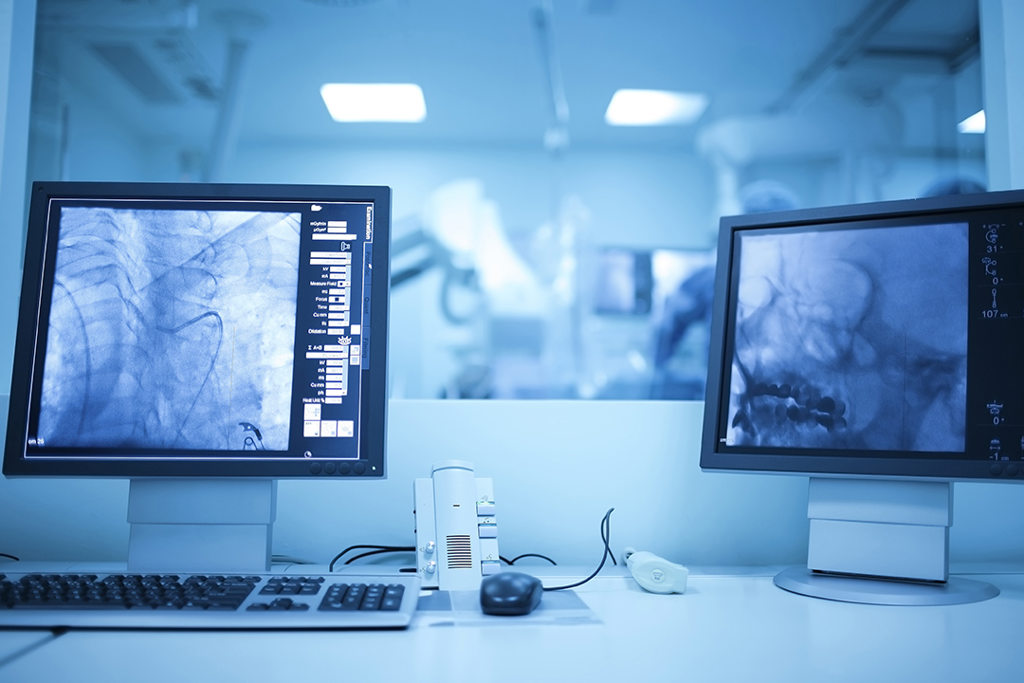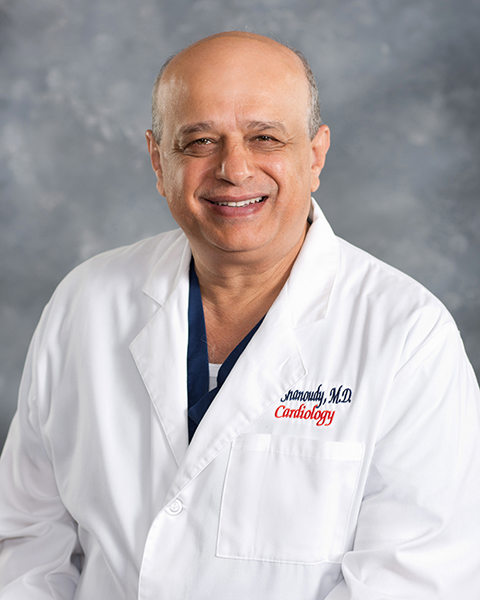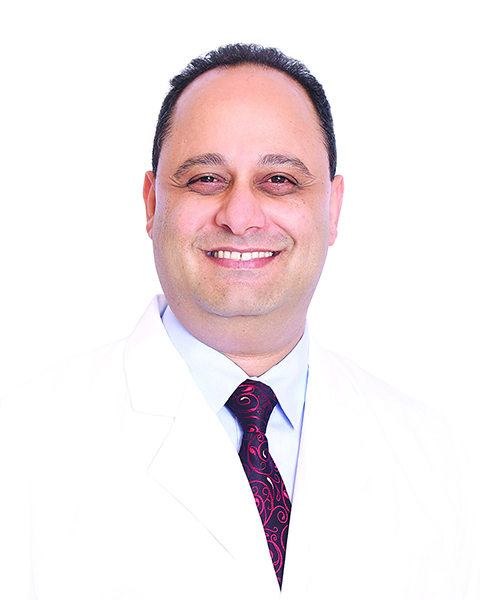
Cardiac Catheterization Helps Hearts Recover
If you are having heart problems or have had a heart attack, you may have been told you need a cardiac catheterization. Performed at Penn Highlands Heart Center’s Cardiac Catheterization Labs in DuBois, Huntingdon and Monongahela, your cardiologist will use this procedure to help determine if there are blockages in your arteries preventing blood flow to your heart. If blockages are found, your cardiologist also may clear them during the heart catheterization.
What is Cardiac Catheterization?
Cardiac catheterization is a minimally invasive procedure that lets Penn Highlands cardiologists get an up-close view of the arteries in and around your heart. To access the arteries, our heart doctors thread a small, hollow tube called a catheter, through a blood vessel that leads to your heart. They then inject a contrast dye into the arteries through the catheter. This allows your cardiologist to use low-dose X-ray technology to identify areas of decreased blood flow due to narrowed or blocked arteries.
If a blockage is found, the cardiologist can perform a procedure called an angioplasty through the catheter at the time of the diagnostic catheterization. During an angioplasty, the cardiologist will thread a tiny balloon into the area of plaque buildup. Once in place, the balloon is inflated, which compresses the plaque and opens the artery to restore blood flow. Oftentimes, a stent -- a small mesh tube that acts as scaffolding – will be placed in the artery to keep it from collapsing after the plaque is removed.
Who Needs a Cardiac Catheterization?
You might need a cardiac catheterization if your heart doctor suspects you have any blocked arteries, heart failure, or other types of heart disease. Symptoms that may indicate heart disease include chest pain, shortness of breath, dizziness, fatigue, and abnormal results from a screening exam, such as an electrocardiogram (ECG) or stress test.
Your heart doctor also may recommend cardiac catheterization if you have chest pain following a heart attack, heart bypass surgery, or prior cardiac catheterization.
What are the Risks of Cardiac Catheterization?
Side effects and complications from cardiac catheterization are unlikely, but they can occur. The most common are:
- Bleeding, bruising, pain, or infection where the catheter is inserted into the body (usually the groin)
- Blood clot or blood vessel damage
- Heart rhythm problems
Serious complications are even more rare but can include:
- Sudden blockage of a coronary artery
- A tear in the lining of an artery
- Kidney damage from the contrast dye
You can reduce your risk of complications by choosing a cardiologist and hospital with extensive experience in cardiac catheterization, like Penn Highlands Healthcare. Penn Highlands cardiologists perform more than 2,500 heart catheterizations annually to diagnose problems patients may have with their heart muscles, valves, or coronary arteries. Problems with the heart can be serious, leading to heart attack, heart failure, or even death. Heart catheterization is a lifesaving procedure. Most patients who have it done go on to lead healthy, full lives with the assistance of cardiac rehabilitation.

Interventional Cardiology
DuBois Regional Cardiology Associates - State College
A Partnered Service with Penn Highlands Healthcare
DuBois Regional Cardiology Associates - St. Marys
A Partnered Service with Penn Highlands Healthcare
DuBois Regional Cardiology Associates - DuBois
A Partnered Service with Penn Highlands Healthcare
DuBois Regional Cardiology Associates - Punxsutawney
A Partnered Service with Penn Highlands Healthcare

Cardiology
DuBois Regional Cardiology Associates - State College
A Partnered Service with Penn Highlands Healthcare
DuBois Regional Cardiology Associates - St. Marys
A Partnered Service with Penn Highlands Healthcare
DuBois Regional Cardiology Associates - DuBois
A Partnered Service with Penn Highlands Healthcare

Cardiology
Cardiology Associates of Altoona, LLP - Altoona
A Partnered Service with Penn Highlands Healthcare

Cardiology
Cardiology Associates of Altoona, LLP - Huntingdon
A Partnered Service with Penn Highlands Healthcare
Cardiology Associates of Altoona, LLP - Altoona
A Partnered Service with Penn Highlands Healthcare

Cardiology
DuBois Regional Cardiology Associates - State College
A Partnered Service with Penn Highlands Healthcare
DuBois Regional Cardiology Associates - Clearfield
A Partnered Service with Penn Highlands Healthcare
DuBois Regional Cardiology Associates - DuBois
A Partnered Service with Penn Highlands Healthcare

Cardiology
Cardiology Associates of Altoona, LLP - Huntingdon
A Partnered Service with Penn Highlands Healthcare

Cardiology
Cardiology Associates of Altoona, LLP - Altoona
A Partnered Service with Penn Highlands Healthcare
Cardiology Associates of Altoona, LLP - Huntingdon
A Partnered Service with Penn Highlands Healthcare


Cardiology
Cardiology Associates of Altoona, LLP - Huntingdon
A Partnered Service with Penn Highlands Healthcare

Cardiology
Cardiology Associates of Altoona, LLP - Altoona
A Partnered Service with Penn Highlands Healthcare
Cardiology Associates of Altoona, LLP - Huntingdon
A Partnered Service with Penn Highlands Healthcare

Cardiology
Cardiology Associates of Altoona, LLP - Altoona
A Partnered Service with Penn Highlands Healthcare
Cardiology Associates of Altoona, LLP - Huntingdon
A Partnered Service with Penn Highlands Healthcare

Cardiology
Cardiology Associates of Altoona, LLP - Huntingdon
A Partnered Service with Penn Highlands Healthcare
Cardiology Associates of Altoona, LLP - Altoona
A Partnered Service with Penn Highlands Healthcare
Cardiac Catheterization at Penn Highlands
A heart or cardiac catheterization is a minimally invasive, outpatient procedure that allows a cardiologist to effectively diagnose, and often treat, heart problems in patients who are suspected of having a blockage or other issues within the arteries.
Cardiovascular and Cardiac Interventional procedures:
- Cardioversions
- Transesophageal Echocardiography (TEE)
- Venograms
- Right Heart Catheterizations (RHC)
- Left Heart Catheterizations (LHC)
- Percutaneous Intervention (PCI)
- Coronary Angiography
- Angioplasty
- Stenting
- Thrombectomy
- Intravascular Lithotripsy (Shockwave)
- Intervention for in-stent restenosis
- Coronary IVUS/FFR
- Intra-Aortic Balloon Pump insertion
- IMPELLA placement (CP and 5.5)
- 24/7 Emergency availability
Structural Heart procedures:
- Transcatheter Aortic Valve Replacement (TAVR)
- Valvuloplasty
Cardiac Rhythm Implantable Electronic Devices:
- Permanent Pacemakers
- Implantable Cardioverter Defibrillator (ICD)
- Biventricular Implantable Cardioverter-Defibrillator (BIV ICD)
- Biventricular Implantable Pacemaker ( BIV PPM)
- Subcutaneous Implantable Cardioverter-Defibrillator (S-ICD)
- Loop Recorder insert and removal
- Temporary Pacemaker
Peripheral Vascular procedures performed by Cardio-thoracic Surgeons or Cardiologists:
- Peripheral Angiograms
- Peripheral Venograms
- Peripheral Angioplasty and stenting
- Mesenteric Angiography
- Subclavian
- Abdominal Aorta
- Femoral
- Lower extremity
- Peripheral Thrombectomy and Embolectomy
- Peripheral IVUS/FFR
- Peripheral Intravascular Lithotripsy (Shockwave)
- Thoracic Endovascular Aortic Repair (TEVAR)
- Abdominal Endovascular Aortic Repair for AAA (EVAR)
- Carbon Dioxide Angiography
- Lower extremity runoffs
- Surgical interventions
- 24/7 emergency availability
A heart or cardiac catheterization is a minimally invasive, outpatient procedure that allows a cardiologist to effectively diagnose, and often treat, heart problems in patients who are suspected of having a blockage or other issues within the arteries.
Cardiac Cath Lab Procedures:
- Transesophageal echocardiography (TEE)
- Cardioversions
- Heart Catheterizations (both Left and Right) including coronary angiography, with 24/7/365 STEMI and other emergency call coverage
- Percutaneous Coronary Intervention (PCI) including but not limited to angioplasty, stenting, thrombectomy, and intravascular lithotripsy (i.e. Shockwave)
- Peripheral venograms
- Peripheral angiograms for Renal, Subclavian, Abdominal Aorta with lower extremity runoffs, and AV Fistulas
- Peripheral interventions including but not limited to angioplasty, stenting, thrombectomy, atherectomy, and intravascular lithotripsy (i.e. Shockwave)
- Loop Recorder insertions & removal
- Temporary Pacemaker insertion
- Permanent Pacemaker (PPM) insertion and generator change
- Implantable Cardioverter Defibrillator (ICD) insertion and generator change
- IVC Filter insertion
- Pericardiocentesis
- Intravascular Ultrasound (IVUS)
A heart or cardiac catheterization is a minimally invasive, outpatient procedure that allows a cardiologist to effectively diagnose, and often treat, heart problems in patients who are suspected of having a blockage or other issues within the arteries.
Cardiovascular and Interventional Procedures:
- Transesophageal Echocardiography (TEE)
- Heart Catheterizations (Left and Right)
- Includes coronary angiography
- 24/7/365 STEMI coverage
- Percutaneous Coronary Intervention (PCI)
- Angioplasty
- Stenting
- Thrombectomy
- Intravascular lithotripsy (e.g., Shockwave)
- Drug-coated balloon (DCB) for in-stent restenosis (ISR)
- Pericardiocentesis
- Loop Recorder Insertion and Removal
- Temporary Pacemaker Insertion
- Coronary IVUS and iFR/FFR
Peripheral Vascular Procedures:
- Peripheral Venograms
- Peripheral Angiograms
- Renal
- Subclavian
- Abdominal Aorta
- Lower extremity runoffs
Interventions include:
- Angioplasty
- Stenting
- Atherectomy
- Thrombolytic therapy
- Mechanical thrombectomy (venous and arterial)
- Intravascular lithotripsy (IVL)
- Stab phlebectomy
- IVC filter insertion and removal
Other Procedures Performed in the Cardiac Catheterization Lab by interventional radiology:
- Transcatheter Arterial Chemoembolization (TACE)
- Tunneled Dialysis Catheter Insertion and Removal
- Percutaneous Transhepatic Cholangiography (PTC) Drain Placement
- Nephrostomy Tube Insertion
